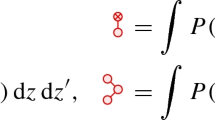Abstract
The first initial-boundary problem for a parabolic equation with a small parameter under external action described by some random process satisfying an arbitrary condition of weak dependence is considered. Averaging of the coefficients over a time variable is carried out. The existence of a generalized solution for the initial stochastic problem as well as for the problem with an “averaged” equation which turns out to be deterministic is assumed. Exponential bounds of the type of the well-known Bernstein inequalities for a sum of independent random variables are established for the probability of the deviation of the solution of the initial equation from the solution of the “averaged” problem.
Similar content being viewed by others
Literature cited
O. A. Ladyzhenskaya, V. A. Solonnikov, and N. N. Ural'tseva, Linear and Quasilinear Equations of the Parabolic Type [in Russian], Nauka, Moscow (1967).
I. I. Gikhman, “On the mixed problem for a stochastic differential equation of the parabolic type,” Ukr. Mat. Zh.,32, No. 3, 367–372 (1980).
I. A. Ibragimov and Yu. V. Linnik, Independent and Stationary Connected Variables [in Russian], Nauka, Moscow (1965).
Author information
Authors and Affiliations
Additional information
Translated from Ukrainskii Matematicheskii Zhurnal, Vol. 43, No. 3, pp. 315–322, March, 1991.
Rights and permissions
About this article
Cite this article
Bondarev, B.V. Averaging in parabolic systems subject to weakly dependent random actions. The L2-approach. Ukr Math J 43, 279–286 (1991). https://doi.org/10.1007/BF01670066
Received:
Issue Date:
DOI: https://doi.org/10.1007/BF01670066



